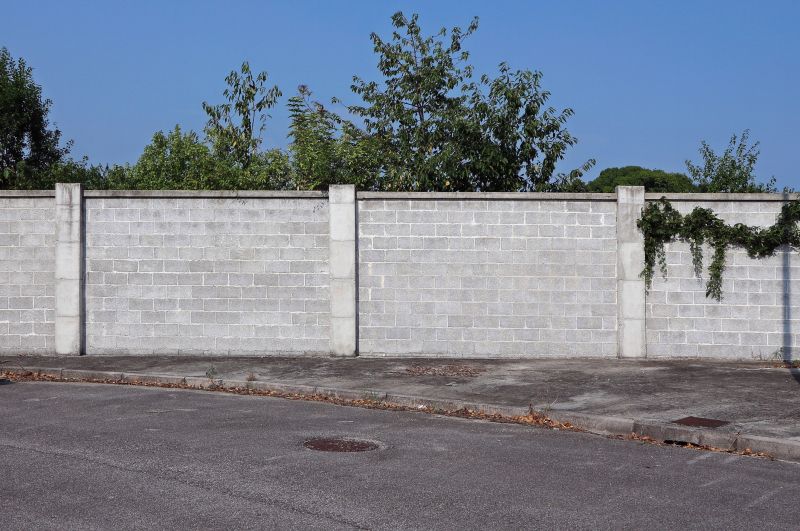Leading Products for Block Wall Replacements You Can Trust
Explore top-rated materials and tools designed to ensure durable, reliable, and visually appealing block wall repairs.
 Replacing or repairing a block wall requires careful selection of the right products to ensure stability, durability, and aesthetic appeal. When considering options for wall replacement, it's important to understand the various materials and tools available. Masonry units such as concrete blocks and cinder blocks are common choices, each offering different strengths and finishes suitable for various applications. In addition to the blocks themselves, mortar mixes and adhesive products play a crucial role in securing the blocks and ensuring longevity. Proper preparation, including surface cleaning and foundation inspection, can significantly impact the success of the replacement process.
Replacing or repairing a block wall requires careful selection of the right products to ensure stability, durability, and aesthetic appeal. When considering options for wall replacement, it's important to understand the various materials and tools available. Masonry units such as concrete blocks and cinder blocks are common choices, each offering different strengths and finishes suitable for various applications. In addition to the blocks themselves, mortar mixes and adhesive products play a crucial role in securing the blocks and ensuring longevity. Proper preparation, including surface cleaning and foundation inspection, can significantly impact the success of the replacement process.
Top Overall Option
Concrete Block Replacement Kit
A comprehensive concrete block replacement kit provides all the essential components needed for repairing or replacing a section of a block wall. These kits typically include a selection of concrete blocks, mortar mix, and necessary tools, making them a convenient choice for DIY projects. They are designed to ensure compatibility and ease of use, helping to achieve a stable and durable repair. Ideal for both small repairs and larger projects, these kits offer versatility and reliability for maintaining structural integrity.
Types of Products For Block Wall Replacements
Concrete Blocks
Standard concrete blocks come in various sizes and finishes, suitable for structural and decorative walls.
Cinder Blocks
Cinder blocks are lightweight and cost-effective, often used for non-load bearing walls.
Mortar Mix
Specialized mortar mixes ensure proper bonding between blocks and long-term stability.
Masonry Adhesive
Masonry adhesives provide an alternative to mortar for quick and clean repairs.
Reinforcing Steel
Rebar or steel mesh adds structural support for larger or load-bearing walls.
Waterproof Sealants
Sealants help protect the wall from moisture and weather-related damage.
Wire Mesh
Wire mesh can be embedded within mortar to enhance stability for larger repairs.
Grout
Grout is used to fill gaps and provide additional bonding strength.
Concrete Patching Compound
Used for filling small cracks and surface imperfections before finishing.
Anchor Bolts
Anchor bolts secure new blocks to existing structures or foundations.
Popular Choices
A versatile kit that includes essential materials for block wall repairs, suitable for DIY enthusiasts.
Convenient pre-mixed mortar simplifies the process of bonding blocks securely.
Popular for adding structural support in larger or load-bearing wall repairs.
Commonly used to protect repaired walls from moisture damage.
Widely used for structural replacements requiring durability.
Popular for fast repairs and small patch jobs.
A common choice for filling gaps and reinforcing joints.
Frequently selected for enhancing stability in large-scale repairs.
Used for small surface repairs to improve appearance and integrity.
Popular for securing new blocks to existing structures.
For larger or structural repairs, reinforcing materials like rebar or wire mesh may be necessary to provide additional stability. Sealants and waterproofing agents can also be applied to protect the wall from moisture penetration and deterioration over time. When selecting products, consider the specific requirements of your project, such as load-bearing capacity, environmental exposure, and aesthetic preferences. It's advisable to choose products that are compatible with existing materials and to follow manufacturer instructions carefully.
Overall, the process of replacing a block wall involves a combination of suitable materials and proper techniques. Whether undertaking a minor repair or a complete replacement, having the right products on hand can facilitate a smoother project. Consulting with professionals or experienced DIYers can provide valuable insights into the best practices and product choices for your specific situation. With the right approach and quality materials, you can achieve a durable and visually appealing wall that meets your needs.
Key Buying Considerations
- Assess the size and scope of your repair project to determine the quantity and type of materials needed.
- Choose products compatible with existing wall materials to ensure proper bonding and stability.
- Consider whether the wall is load-bearing or decorative to select appropriate reinforcement options.
- Evaluate environmental exposure factors such as moisture, temperature, and weather conditions when selecting sealants and waterproofing products.
- Opt for high-quality, durable materials that meet industry standards for long-term performance.
- Determine if reinforcement like rebar or wire mesh is necessary for structural integrity in larger repairs.
- Check product compatibility, especially when combining adhesives, mortar, and sealants, to prevent issues later on.
- Review manufacturer instructions carefully and follow recommended application techniques for best results.
- Consider the ease of use and whether you need pre-mixed or dry materials based on your skill level and project timeline.
- Factor in budget constraints while prioritizing quality to ensure a reliable and lasting repair.
- Think about the aesthetic finish desired, especially if the wall will be visible or decorative.
- Ensure safety by using appropriate protective gear and following handling instructions for chemical products.
- Plan for curing and drying times to avoid delays in your project schedule.
- Consult with professionals if unsure about structural requirements or complex repairs.
- Read customer reviews and ratings to gauge product performance and satisfaction.
This content contains affiliate links and is for informational purposes only. Always verify product specifications and consult professionals when undertaking structural repairs.
